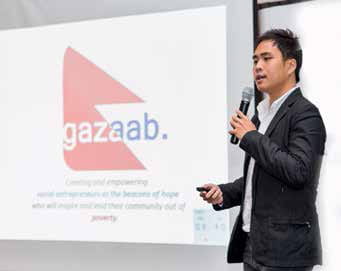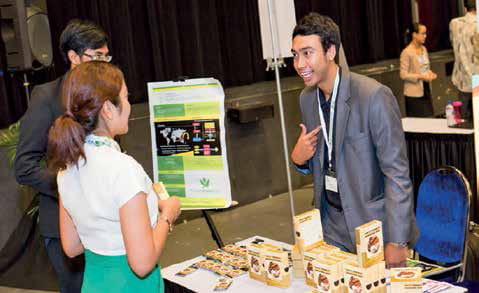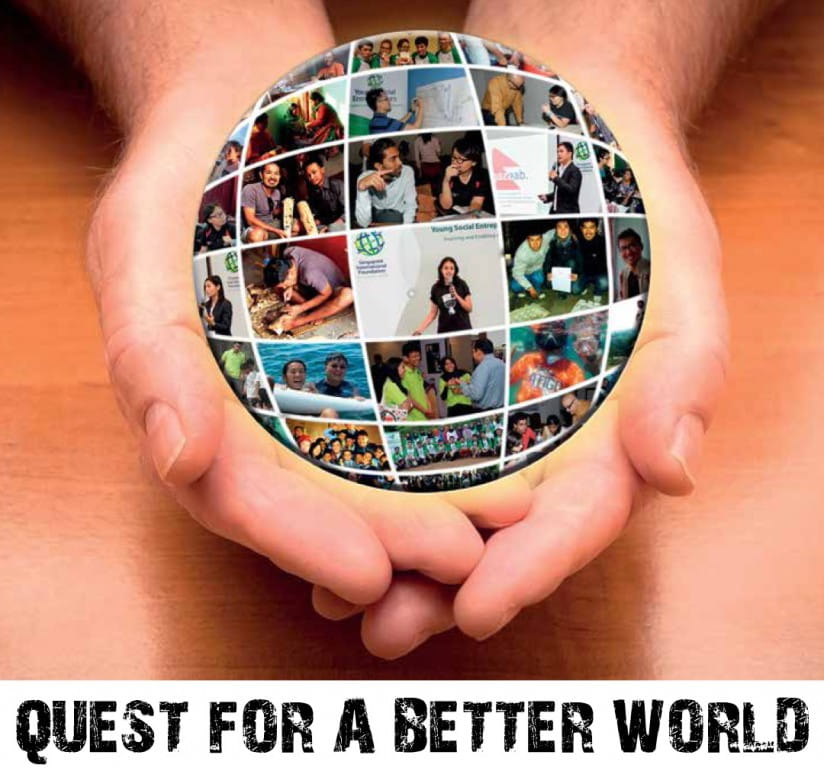
Meet the winning teams of young do-gooders from SIF’s 2013 Young Social Entrepreneurs (YSE) programme, who have been pushing for change and making a difference in the world. Founders of Gazaab, Social Cops, AgriSocio and The Dorsal Effect talk about their journey thus far, and dish out advice to other young aspiring changemakers.
By Cynthia Chung
GAZAAB
he brains behind Gazaab — Akash Gurung, 24, from Nepal and Jamon Mok, 25, from Singapore — know the importance of forging alliances. Gazaab, which means ‘awesome’ in Nepalese, is a social venture fund that seeks to help rural communities out of poverty by equipping them with the business tools to set up sustainable businesses. For the past three years, Gazaab has made inroads in Kathmandu and Phnom Penh, helping start up more than 20 enterprises in four communities.

Gazaab’s Jamon Mok aims to empower people to create sustainable businesses by
understanding basic business concepts.
What does Gazaab do?
MOK: “We aim to empower people to create sustainable businesses by understanding basic business concepts such as writing a business plan, and providing mentorship, funding and networks to help them get started.”
How has Gazaab made a difference?
MOK: “The first level of change is a crucial mindset shift, that their only options are to be migrant workers or lowly paid employees. They are encouraged to realise they can effect change and create social impact not only on their families but also on their community. As they grow in confidence, they will eventually influence others to follow suit.
The second level of change occurs when they take concrete actions with our support and funding. The enterprises they create have helped to supplement their family’s income, allowed them to help support their siblings’ education and have given them confidence to play a part in changing the fate of their family and the community. The end result is a very entrepreneurial community driven by young people committed to helping grow the community and lead them out of poverty.
Where do you see Gazaab in the next few years?
MOK: ”We have high hopes for our social venture spinoff, Backstreet Academy, which allows independent entrepreneurs and artisans in Kathmandu and Phnom Penh to create an authentic experience for tourists, either via cooking classes or traditional craft sessions. We see ourselves expanding really quickly in the next few years, tripling our city offices by the end of this year and expanding all over Asia in three years.”
SOCIAL COPS
Problems — and solving them — are nothing new to Prukalpa Sankar, 24, who hails from India and is the primary architect behind Social Cops, a crowd sourcing, citizen-voting platform established in India to bridge the vast information divide in rural communities. Social Cops co-founders, Varun Banka, and Jahagirdar Kaya Naryan, both 23, are also from India.
What is Social Cops’ underlying purpose?
SANKAR: ”We bridge the information gap in communities to address some of the biggest problems in the world — public health, education and civic issues. While doing so, we collect valuable data from the grassroots by using the simplest and most powerful means — mobile phones and people. We then make this data accessible to government officials and policy makers who need relevant facts and figures to make informed decisions.”
How has Social Cops made a difference?
SANKAR: ”We improved cervical cancer vaccination rates by 400 per cent, created public worker incentives to get neighbourhood streets cleaned, allocated resources toward fixing broken street lights, disseminated and monitored public welfare scheme information to remote communities in India and mapped areas with pot holes and broken pavements on roads so that the relevant authorities could address the concerns.
We turn the the voice of citizens into a powerful resource and channel it towards solving real-life problems such as sanitation and public infrastructure.”
What advice does Social Cops have for future generations of social entrepreneurs?
SANKAR: ”Never stop asking for help, always invest in yourself, figure out where you want your business to be in two years, validate a business idea by creating a website to promote it (not a 20-page business plan), build your product and test it, rebuild it and test it some more, create scaling build your product, test your product, rebuild your product, test it some more, develop scaling strategies to develop the business and, last, but not least, invest in a network of awesome people to support you.
AGRISOCIO
With a desire to improve the lot of his community, Alfi Irfan, 22, left his job as an agricultural economics data analyst to launch AgriSocio, a social enterprise which aims to benefit farmers in rural Indonesia. He is joined by fellow Indonesians Firman Raditya, Rizal Fahreza and Gugi Yogaswara, as well as Singaporean Syakir Hasyim.

Alfi Irfan launched AgriSocio to help farmers create sustainable businesses in rural Indonesia.
What does AgriSocio do?
IRFAN: “We match agriculture undergraduates with farming communities that lack the technology, capital and marketing know-how to make their businesses sustainable. These students work with the villagers for two years to devise branding, marketing and product recognition strategies for their agricultural products.
How has AgriSocio made a difference?
IRFAN: Our first project was with the Benteng Village, in Bogor, West Java where, for almost six months, our team worked alongside farmers and housewives in the village to create a spiced drink. Made from from an exotic blend of ginger, cumin, cloves, java pepper, black pepper, cinnamon and anise, we called the potion Indorempah and it is already being sold commercially in Indonesia.
In the true spirit of sustainability and ecological conscientiousness, leftover ingredients are used to make three other candy products.
What are your tips for other budding social entrepreneurs?
IRFAN: “Everyone has 24 hours in a day. Some people make decisions that influence millions of people, while there are others who cannot even take care of themselves. The question is: Who are we? For it isn’t your fault if you’re born poor and have nothing, but that doesn’t mean you can’t make any positive contributions to the universe.”
THE DORSAL EFFECT
Singaporean Kathy Xu, 32, is from The Dorsal Effect, a social enterprise that seeks to provide an alternative and sustainable livelihood to shark fishermen in Lombok, Indonesia.

Kathy Xu wants the fishermen in Lombok to swim with sharks instead of killing them.
What prompted you to start The Dorsal Effect?
XU: “Apart from just telling people to stop eating shark’s fin soup, I wanted to instead. Alas, the shark killings continue today because of the lack of funding to direct the market toward sustainable fishing. It’s not an easy journey, but it’s important to press on even when the going gets tough or even if it takes years before you see success.”
What is The Dorsal Effect’s advice to budding social entrepreneurs?
XU: “Don’t expect to make too much headway too soon or you could end end up crashing and burning. Make sure what you do comes from something you really feel for and believe in wholeheartedly.”
What would you like to see The Dorsal Effect achieving?
XU: “I’d like to adopt sustainable fishing methods and rebuild Lombok’s ecosystem so that people can actually swim with sharks during their boat trips.”
2014 YOUNG SOCIAL ENTREPRENEURS TEAMS
Into its fifth run this year, the SIF Young Social Entrepreneurs’ (YSE) programme has grown in breadth and depth since the inaugural workshop in 2010. It started out as a five-day workshop and has grown into a year-long programme comprising mentorship programmes led by McKinsey, overseas study visits and funding to start and develop social entrepreneur projects.
The YSE programme kicked off with a three-day workshop from 13-15 March this year. Nine multinational teams comprising participants from countries such as Cambodia, Malaysia, Singapore, Thailand and India, were shortlisted at the end of the three-day workshop.
Progressing to the next stage of the programme, these young changemakers recently concluded a very colourful week-long study visit programme in Mumbai, engaging and learning from leading social innovators there. They will continue to fine-tune and sharpen their business proposals for the final stage later this year, when they will pitch their best social enterprise ideas to a panel of industry judges, for funding to kick-start or scale up their social enterprise. Here’s a close-up with five of the teams:







